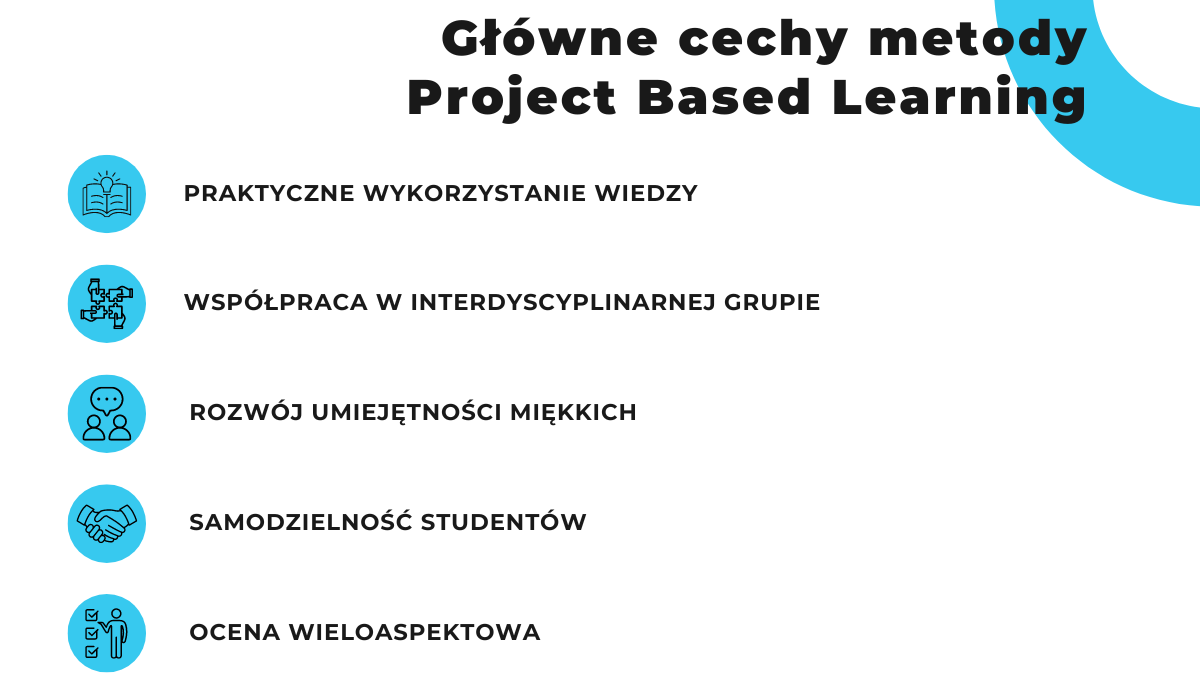Project Based Learning (PjBL), also known as project-based education or project teaching, is a teaching method based on students completing projects.It involves designing, developing and constructing practical solutions to a problem or new products.
Students should come from various fields of study and work in groups of 4-6. An academic teacher (main supervisor) is responsible for overseeing the project's execution and its substantive value. They act as a mentor for the group process, helping the group achieve the project's goal and resolve any conflicts within the group. The main supervisor may be supported by auxiliary supervisors representing different fields of study/disciplines than the main supervisor. They ensure that students from other fields achieve the learning outcomes specific to their study direction.
W trakcie realizacji projektu studenci mają również kontakt z ekspertami np. przedstawicielami przedsiębiorstw, organizacji, władz lokalnych, z którymi mogą konsultować pomysły. Mogą nimi być przedstawiciele przemysłu, organizacji pozarządowych, władz lokalnych o kompetencjach ważnych dla realizacji projektu, albo pracownicy uczelni z udokumentowanymi osiągnięciami w danym obszarze. Z jedną grupą pracuje kilku ekspertów. Rolą ekspertów jest pomoc w rozwiązywaniu konkretnych problemów, które wykraczają poza obszar studiów lub odnoszą się do innych dyscyplin, dzięki czemu studenci zdobywają doświadczenie zawodowe.
Due to the significant workload and high student involvement, PjBL can replace selected subjects included in the program of study, provided that students achieve the appropriate learning outcomes.

- Practical application of knowledge: Students work on a project that requires them to apply the knowledge they've gained to practical applications. These can be research, creative, engineering, social, or other projects.
- Collaboration in an interdisciplinary group: PjBL requires grouping students with different skills and competencies, each of whom makes a significant contribution to the project.
- Soft skills development: In addition to substantive content, PjBL emphasizes the development of soft skills such as problem solving, critical thinking, effective communication, negotiation and teamwork skills.
- Student independence: Students are active participants in the learning process, independently managing their project, making decisions and solving problems.
- Multi-faceted assessment: Assessment in PjBL includes the final product or solution, as well as the process of developing it itself, student involvement, collaboration skills and other aspects related to the project.
Project learning objectives:
- Practical application of learned solutions and methods in the implementation of interdisciplinary projects.
- Focusing students on problem-solving and teamwork skills.
- Integration of students' knowledge and skills from several different areas, which better reflects professional reality.
- Assumption by students of full responsibility for the implementation of the project and its results, and their independence in the process of project implementation.
- In addition to imparting knowledge, also developing practical skills, creativity, critical thinking and readiness to work in a team.
- Projects implemented under PjBL include a wide range of activities and usually have several stages of implementation. The results are often new products, improved technologies or new solutions to existing problems. These are more complex tasks than those carried out under PBL.
Project based learning, like Problem based learning, involves solving real-world problems that occur in the socio-economic environment.
Project based learning and Problem based learning are two different learning methods, although there are similarities between them due to the solving of practical problems.
The main differences between these methods are:
- PBL is concerned with solving one specific problem or case, which may have different aspects that require analysis and understanding.
- The duration of a PjBL project is usually longer than the completion of a PBL assignment, and can last from one to several semesters.
- Completion of a project in PjBL requires the cooperation of all group members, who are selected for their different skills and qualifications (e.g., students from different majors). Each contributes to the final solution. Within the framework of PBL, most often students of the same field of study/specialty work together in groups and tasks are solved within the framework of classes in a specific subject.
More information:
Boston University Center for Teaching & Learning, https://www.bu.edu/ctl/guides/project-based-learning/